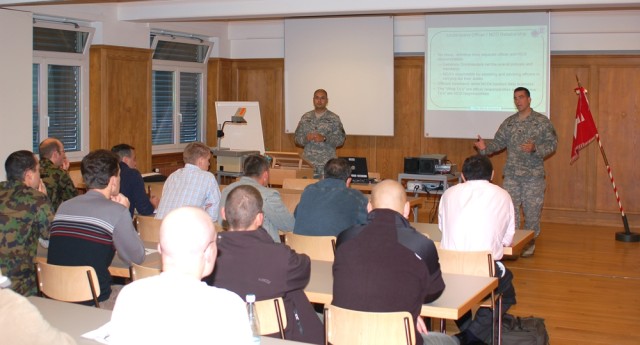
SION, Switzerland - "Communication is the key" served as the main theme for the 2007 NATO/ Partnership for Peace International NCO leadership course at the Swiss Armed Forces junior training center in Sion, Switzerland. Two "communicators" from United States Army, Europe's 5th Signal Command were handpicked as guest speakers to give their expertise to noncommissioned officers representing 19 different nations.
The 128th Signal Company command team of Capt. Ken Donnolly and 1st Sgt. Samuel Taylor and from 5th's 2nd Signal Brigade, 39th Signal Battalion in Belgium where chosen by North Atlantic Treaty Organization's top enlisted Soldier, Command Sgt. Major Michael Bartelle, to teach "Officer and NCO relations at the company level" on the last day of the two-week course held in early October.
"It's a great honor that we were picked," said Taylor, who is no stranger to working with other militaries at Supreme Headquarters Allied Powers Europe.
The signal duo described the U.S. Army company-level officer/NCO relationship as a quasi-marriage where the two often spend more time together than their actual spouses. The two drew rousing laughter from the class when they debated over who is the husband and wife in their "marriage."
The team received raised eyebrows when Taylor revealed that U.S. NCOs train not only the junior enlisted Soldiers but the officers as well in courses such as Airborne and Ranger schools.
"Young officers are bred, trained and guided by senior NCOs at a company level, and the experience and knowledge they gain from those NCOs shape them into becoming good senior officers and commanders," said Taylor to the class.
Donnelly, who was also an NCO before becoming a commissioned officer, said that no commander can succeed without strong NCOs leading the way to accomplish the mission at hand.
"A key strength of any good officer is his or her ability to delegate responsibility to their NCOs," said Donnolly.
The two were followed by NCOs from Norway, Spain and Great Britain who shared their military's NCO structure and how they relate with officers. This time the eyebrows of Taylor and Donnolly were raised when the Norwegian NCO said he was on a first-name basis with every officer when he was assigned to an air base.
In stark contrast, the Spanish NCO said that their officers and NCOs work and live in strict, segregated worlds where most mission responsibility is given to officers. The British NCO said that their officers sometime speak a different language that the enlisted don't understand, but that NCOs are slowly given more responsibility in their units.
The class was by and large in unison agreement that NCOs in any military need to be "the backbone" of a unit. "The officers are the managers, but the NCOs make it happen," added Taylor.
Another topic was the NCO rank structure of the different nations. Attendees said many countries have less than four NCO ranks due in large part to them having conscript enlisted forces where their citizens are required to serve a minimum amount of time. The individuals who exceed their peers as an enlisted conscript are often offered an officer position to join the professional, career force, which renders the NCO ranks scarce.
Taylor was introduced to a 22-year-old Swiss Army 1st Sgt. who had only served 2 years before making her rank as opposed to his own record of 15 years of service. Taylor took this a glowing example of how many militaries need to increase the size of their NCOs corps and place more emphasis on the roles and responsibilities of NCOs in the chain of command.
Command Sgt. Major Richard Blanc, chief of NCO development for the Swiss Armed Forces and co-developer of the international NCO leadership course, said one of main reasons this course was created was because there is such a strong need for NCO development in most Partnership for Peace militaries today.
The two-week training provides three opportunities to attend with a preliminary, intermediate and advanced NCO course that dates back to 2005. Each course has two NCOs per country that accept an invitation from NATO to attend. The course modules are taught by senior NCOs and experts from various partner countries on a rotating basis. Up to now each course has received nothing but high ratings and positive feedback from attendees, said Blanc.
"We want to spread the virus of international relations through these courses," said Blanc, who is currently trying to hold these courses more often as well as create more development courses that bring nations together.
"We designed the course to include group tasks where NCOs from different nations are teamed together to solve problems and work thru scenarios," said Blanc. The attendees where not only confined to a classroom as they also negotiated repelling and rope climbing drills to build team cohesion.
"This experience was awesome," said Master Cpl. Don Caron from the Canadian Air Force. "This course really showed me a lot about myself as a leader and as a person in general." Caron said he was excited to take the lessons learned from this course and apply it to his current unit.
"I hope the attendees learn that no military can work without strong NCOs," said Donnolly. "I hope they take from this course that communication is the key to success," said Taylor. "Good officers trust their NCOs to get the job done and good NCOs listen and get know their Soldiers," he said.
"The concept and success of this course is a dream come true," said Blanc. "The international collaboration that happens here is something the whole world can benefit from."
(The Partnership for Peace is a program of practical bilateral cooperation between individual Partner countries and NATO. It allows Partner countries to build up an individual relationship with NATO, choosing their own priorities for cooperation.)
For more information, go to http://www.nato.int/issues/pfp/index.html

Social Sharing